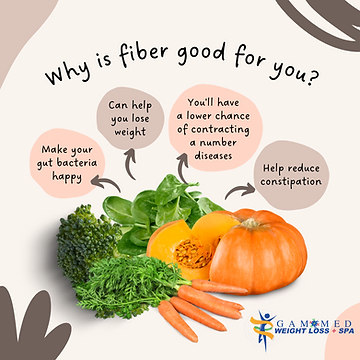In today’s fast-paced world, where fad diets and quick-fix solutions dominate the weight loss industry, it’s easy to overlook the simple yet powerful role of fiber in achieving sustainable weight loss and maintaining optimal health. Fiber, a plant-based component found in fruits, vegetables, legumes, and whole grains, holds the key to unlocking numerous health benefits, including weight management. In this blog post, we will delve into the significance of fiber in weight loss and how it contributes to overall patient health.

Understanding Fiber:
Fiber is a type of carbohydrate that cannot be digested by the human body. Instead, it passes through the digestive system relatively intact, aiding in the proper functioning of the digestive tract. There are two main types of fiber: soluble and insoluble. Soluble fiber dissolves in water, forming a gel-like substance, while insoluble fiber remains intact throughout the digestive process. Both types are vital for optimal health, but their roles in weight loss and patient health differ slightly.
Weight Loss and Fiber:
- Enhanced Satiety: Consuming fiber-rich foods promotes feelings of fullness and satiety. Since fiber takes longer to digest, it slows down the emptying of the stomach, making you feel fuller for longer periods. This reduced hunger can help prevent overeating and assist in maintaining a calorie deficit, a fundamental aspect of weight loss.
- Reduced Caloric Intake: High-fiber foods often have fewer calories compared to their low-fiber counterparts. By choosing fiber-rich options such as fruits, vegetables, and whole grains, you can increase the volume of your meals while keeping the calorie count low. This allows you to satisfy your hunger while staying within your daily caloric limit, aiding in weight loss efforts.
- Blood Sugar Regulation: Soluble fiber plays a crucial role in stabilizing blood sugar levels. By slowing down the absorption of sugar into the bloodstream, fiber prevents rapid spikes and crashes in blood glucose levels. This can help regulate appetite, reduce cravings for sugary snacks, and support steady energy levels throughout the day.
- Improved Gut Health: Fiber acts as a prebiotic, providing nourishment to the beneficial bacteria residing in the gut. A healthy gut microbiome is linked to better digestion, enhanced immune function, and improved nutrient absorption. By promoting a diverse and thriving gut microbiota, fiber contributes to overall health and well-being.
- Reduced Risk of Chronic Diseases: High-fiber diets have been associated with a decreased risk of various chronic diseases, including heart disease, type 2 diabetes, and certain types of cancer. By maintaining a healthy weight and supporting optimal metabolic function, fiber-rich diets provide a protective effect against these conditions.
Incorporating Fiber into Your Diet:
- Choose Whole Foods: Opt for whole foods over processed ones. Include a variety of fruits, vegetables, legumes, and whole grains in your meals to increase your fiber intake. Aim for at least 25-30 grams of fiber per day, gradually increasing your consumption to avoid digestive discomfort.
- Read Labels: When purchasing packaged foods, read the nutrition labels to identify the fiber content. Look for products that contain whole grains and minimal added sugars.
- Go Easy on Fiber Supplements: While supplements can be helpful in meeting daily fiber requirements, it is generally recommended to obtain fiber from whole foods whenever possible. Whole foods offer a wide range of nutrients, antioxidants, and other beneficial compounds that work synergistically with fiber.
- Stay Hydrated: As fiber absorbs water, it’s important to drink an adequate amount of fluids throughout the day. Water helps soften the fiber and aids in its movement through the digestive system, preventing potential constipation.
Conclusion:
When it comes to weight loss and overall health, fiber is an unsung hero that deserves more attention. Its impact on weight management, satiety, blood sugar regulation, gut health, and chronic disease prevention cannot be underestimated. By incorporating fiber-rich foods into your daily diet, you can promote a healthier lifestyle and achieve sustainable weight loss.
Remember to gradually increase your fiber intake, choose whole foods over processed options, and read labels to make informed choices. Additionally, maintaining proper hydration is essential to ensure the smooth passage of fiber through your digestive system.
At Gam-Med Weight Loss, we recognize the vital role of fiber in supporting our patients’ weight loss journeys and overall well-being. Our team of experts are dedicated to providing personalized guidance and education on nutrition, including the importance of fiber, to help you achieve your weight loss goals.
So, let’s embrace the fiber connection and make it an integral part of our lives. By doing so, we can improve our health, shed those extra pounds, and pave the way for a brighter and healthier future.
Remember, small changes can make a big difference, and fiber is the key to unlocking your weight loss potential. Start incorporating fiber-rich foods today and experience the transformative power of this simple yet powerful nutrient.
Disclaimer: The information provided in this blog post is for educational purposes only and should not replace medical advice. Please consult a healthcare professional for personalized recommendations and guidance regarding your specific health and nutritional needs.





